You can deepen your scientific knowledge and prepare for an innovative career by earning a masters in biotechnology.

The rapidly growing field of biotechnology—also known as biotech—uses living cells to develop new products and processes that improve human lives. Biotech experts have created many significant innovations in agriculture, energy, healthcare, sustainability, and other areas.
Editorial Listing ShortCode:
If you want to transform your passion for science into a meaningful career, you might consider enrolling in an online masters in the biotech program.
Universities Offering Online Masters in Biotechnology Degree Programs
Methodology: The following school list is in alphabetical order. To be included, a college or university must be regionally accredited and offer degree programs online or in a hybrid format.
1. George Washington University
George Washington University offers an MSHS in Molecular Diagnostic Science. The program offers coursework online and opportunities to gain real-world experience through clinical rotations. It requires the completion of 35 credits and usually takes 2 years to finish. Potential courses include Medical Biotechnology, Molecular Biology, and Research Ethics and Integrity.
George Washington University is accredited by the Middle States Commission on Higher Education.
2. Harvard University
Harvard University offers a Master’s in Biotechnology through its online extension school. Most students in the program work full-time and take just one course at a time. Courses usually have weekly live discussions. The program includes optional stackable certificates in project management, innovation and entrepreneurship, biotechnology management, and bioinformatics.
Harvard University is accredited by the New England Commission on Higher Education.
3. Johns Hopkins University
Johns Hopkins University offers an MS in Biotechnology with classes available online and on campus during evenings and weekends. The program requires the completion of 36 credits and can usually be completed in 1 to 3 years. Potential courses include Molecular Biology, Advanced Cell Biology, and Cellular Signal Transduction. The completion of a thesis is optional.
Johns Hopkins University is accredited by the Middle States Commission on Higher Education.
4. Marywood University
Marywood University offers a Master of Science in Biotechnology in a flexible online format that usually takes 2 years to finish. The program offers a research track and a business track. Both tracks require the completion of 37 credits. Potential courses include Cell Culture, Bioinformatics, and Emerging Medicines and Technologies.
Marywood University is accredited by the Middle States Commission on Higher Education.
5. Morehouse School of Medicine
Morehouse School of Medicine offers an online program for a Master of Science in Biotechnology. This flexible program requires the completion of 35 credit hours and typically takes 1 year to complete. It is completed with a cohort. Potential classes include Cell Biology, Critical Thinking and Communication, and Biomedical Data Science and Statistics.
Morehouse School of Medicine is accredited by the Southern Association of Colleges and Schools Commission on Colleges.
6. Northeastern University
Northeastern University offers an MS in Biotechnology that can be completed online. The program allows full-time and part-time enrollment and can usually be finished in 2 to 3 years. It offers concentrations in Biodefense, Molecular Biotechnology, Process Science, Manufacturing and Quality Operations, Biopharmaceutical Analytical Sciences, and more.
Northeastern University is accredited by the New England Commission of Higher Education.
7. University of Houston
The University of Houston offers a Master of Science in Engineering Technology—Biotechnology. This highly interdisciplinary program requires the completion of 30 credit hours and either a thesis or a project. The curriculum is designed to teach how to conduct and supervise biomedical research. Potential courses include Experimental Design and Data Analysis, Project Management Principles, and Seminar in Biotechnology.
The University of Houston is accredited by the Southern Association of Colleges and Schools Commission on Colleges.
8. University of Maryland Global Campus
The University of Maryland Global Campus offers a Master of Science in Biotechnology. This 36 credit program is available entirely online, with select courses also offered in a hybrid format. Potential courses include Societal Issues in Biotechnology, Introduction to Bioinformatics, and Bioprocessing and the Business of Biotechnology.
The University of Maryland Global Campus is accredited by the Middle States Commission on Higher Education.
9. University of Wisconsin – Whitewater
The University of Wisconsin—Whitewater offers a Master of Science in Applied Biotechnology. The program is fully online with no set login times but still provides opportunities to collaborate with classmates. There are three specialization tracks: Research and Development, Business Management, and Quality Assurance and Compliance.
UW-Whitewater is accredited by the Higher Learning Commission.
10. Worcester Polytechnic Institute
Worcester Polytechnic Institute offers an MS in Biotechnology. This non-thesis program focuses on practical skills and applications. Coursework can be completed online, but lab sessions must be completed on campus. The lab sessions are scheduled to be convenient for working professionals.
WPI is accredited by the New England Commission of Higher Education.
Masters in Biotechnology Programs Online

Biotechnology has played an essential role in the development of human civilization. In ancient times, humans used biotech to domesticate and selectively breed animals and plants.
Today, biotechnology uses genetic engineering, nanotechnology, and other advanced scientific methods to invent products and solve complex problems. Biotechnology specialists may create new medications or vaccines that treat and prevent emerging diseases. They can also develop innovations like biofertilizers, new methods for fermenting cheese, and pest-resistant crops.
Biotechnology master programs often include extensive business and science coursework. Common subjects include:
- Bioethics
- Biotechnology laws
- Computational biology
- Cancer Biology
- Drug development
- Economics of the biotech industry
- Genetics
- Immunobiology
- Infectious diseases
- Molecular biology
- Pharmacology
- Project management
- Neurobiology
You may have the opportunity to expand your knowledge of these topics by participating in laboratory courses and conducting research under faculty supervision. Many biotech graduate students also sharpen their research and writing skills by completing a master’s thesis.
Graduates from masters programs in biotechnology pursue careers in a broad range of industries. Potential job titles include:
- Food scientist
- Biochemist
- Bioinformatics scientist
- Biomedical engineer
- Biophysicist
- Community college professor
- Geneticist
- Industrial production manager
- Microbiologist
- Natural science manager
Some graduates choose to continue their education by earning a PhD in Biotechnology. This degree can help you qualify for more advanced academic and research roles.
Common Online Masters Degree in Biotechnology Concentrations
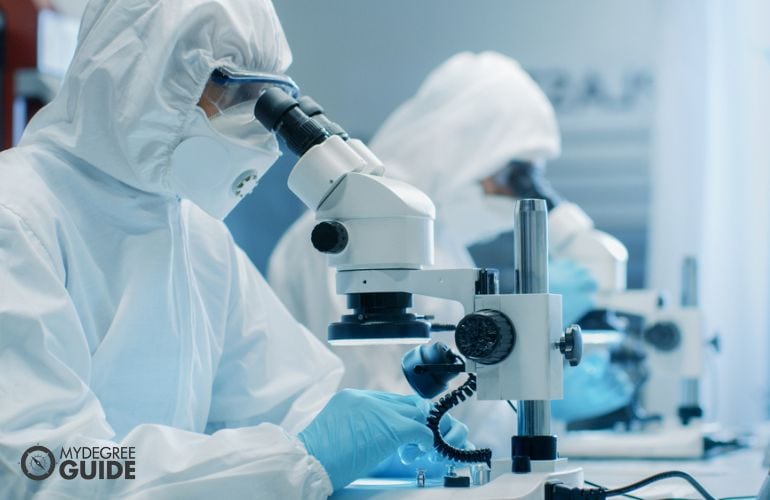
Many masters programs allow you to complete a complementary graduate certificate or specialize in a subfield of biotechnology, such as:
- Bioinformatics. You’ll learn how to use algorithms, genetic databases, and other computer-powered tools to extract, interpret, and alter DNA.
- Biotechnology Business. You’ll discover the business and financial side of biotechnology and prepare for a project management or research career in the field.
- Drug Design and Discovery. This specialization helps prepare you for a career in the pharmaceutical or healthcare industry by teaching you methods for creating, manufacturing, and testing new medications.
- Regenerative and Stem Cell Technologies. This concentration focuses on concepts and laboratory methods in regenerative medicine and stems cell research.
- Translational Biotechnology. You can gain a deeper understanding of how you can use genes and molecules to develop novel drugs and therapies.
Available specializations vary by school, so it’s beneficial to research concentrations and coursework ahead of time to find a program that fits your interests.
Biotechnology Careers and Salaries
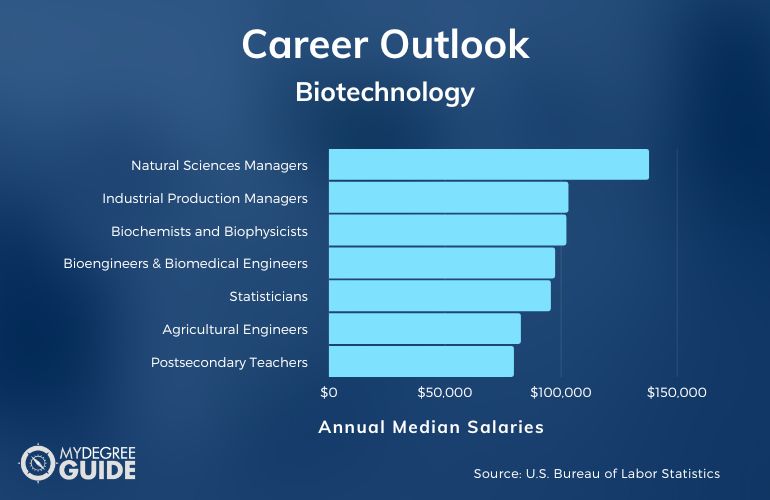
Biotechnologists can pursue a range of roles in academia, consulting, private industry, and research. Sectors that frequently employ graduates with biotech masters degrees include agriculture, bioinformatics, healthcare, manufacturing, energy, and pharmaceuticals.
Some biotechnologists choose to start their own companies and channel their passions into developing new technologies, like biofuels and medical devices. Completing business and finance courses during your master’s degree can help set you up for entrepreneurial endeavors.
According to the Bureau of Labor Statistics, here are some potential careers related to biotechnology.
| Careers | Annual Median Salaries |
| Natural Sciences Managers | $137,900 |
| Industrial Production Managers | $103,150 |
| Biochemists and Biophysicists | $102,270 |
| Bioengineers and Biomedical Engineers | $97,410 |
| Statisticians | $95,570 |
| Agricultural Engineers | $82,640 |
| Postsecondary Teachers | $79,640 |
| Microbiologists | $79,260 |
| Agricultural and Food Scientists | $74,160 |
| Clinical Laboratory Technologists and Technicians | $57,800 |
The Bureau of Labor Statistics predicts that many jobs associated with biotechnology will experience faster-than-average growth over the next ten years. For example, the demand for biochemists and biophysicists is expected to increase by 15%.
Other positions anticipated to experience positive job outlooks include postsecondary teachers (12% job growth), bioengineers and biomedical engineers (10%), microbiologists (9%), and agricultural and food scientists (8%). Your employer, location, work experience, and other factors can influence your specific career opportunities and salary.
Completing a biotechnology-related internship or certificate may positively affect your job qualifications and earning potential.
Biotech Masters Curriculum & Courses
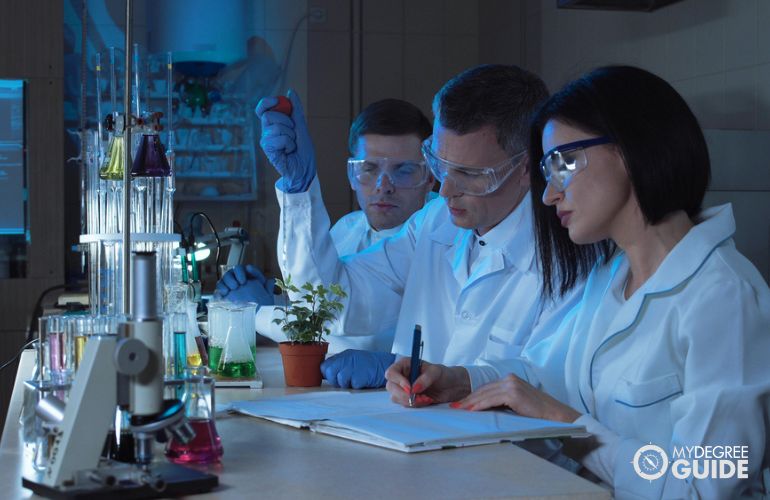
The courses required by masters programs in biotechnology can differ between schools, but you may have the opportunity to take courses similar to these:
- Advanced Cell Biology: You’ll analyze the evolution, structure, and mechanics of cells and learn about experimental methods used to study the building blocks of life.
- Bioethics: This course applies philosophical theories to contemporary ethical dilemmas in biotechnology, including animal research, data collection, in vitro fertilization, and organ transplantation.
- Biotechnology Law: This class focuses on laws governing the biotechnology industry, such as contracts, intellectual property, and patent laws.
- Drugs and Disease: You’ll learn about human diseases, the process of creating new drugs, and the latest therapeutic breakthroughs.
- Emerging Issues in Biotechnology: You’ll study how cultural, political, and social factors impact the public’s perception of biotechnology and explore the field’s advantages and risks.
- Finance for Biotechnology: You’ll learn introductory financial concepts and theories and gain a working knowledge of how stakeholders make decisions in the global life science industry.
- Genetics: You’ll analyze the historical development of knowledge about genetics, gene purposes and structure, and current genetic research.
- Introduction to Regulatory Affairs: This class covers the history of regulatory affairs in the United States, regulations imposed on biotechnology products and research by the Federal Drug Administration, and methods to get inventions approved.
- Project Management in Biotechnology: You’ll study the lifecycle of a project from concept to completion and learn how to implement project management approaches at each stage.
- Stem Cell Biology and Applications: This course explores contemporary understandings of stem cell research and possible medical applications of stem cells.
Some biotechnology master programs also require students to complete a capstone project or master’s thesis.
Admissions Requirements

Masters programs in biotechnology can each have unique admissions processes, but many schools share some basic requirements, such as:
- Bachelor’s degree in a relevant field, like biology or chemistry
- 0 minimum GPA, on average
- Transcripts from your undergraduate institute
- Letters of recommendation
- A personal statement discussing your interests, work experience, and professional goals
Some schools ask you to submit GRE or GMAT scores with your graduate application, but many programs have eliminated this requirement. It’s beneficial to research the admissions requirements for every program of interest to ensure you meet their criteria.
Accreditation
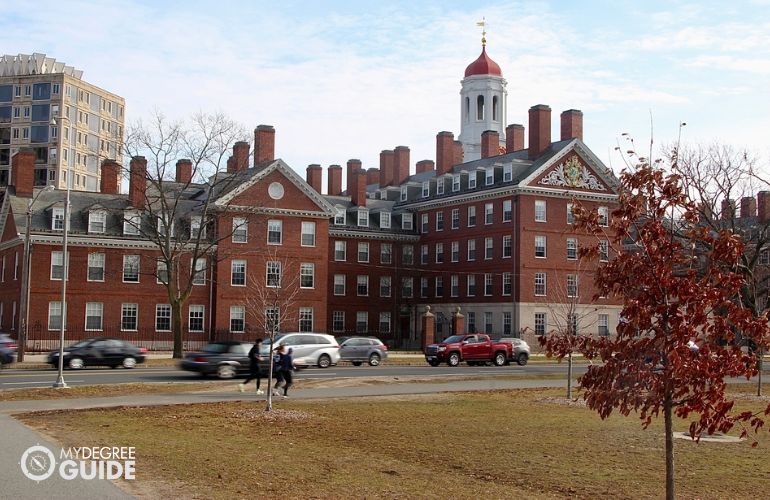
A school’s accreditation status is one factor to consider when selecting a biotechnology masters program. Colleges and universities can earn regional accreditation if they demonstrate that they’ve met strict educational standards created by a regional accrediting organization.
Attending an accredited school has many benefits. It’s necessary to be enrolled at an accredited institution to qualify for some financial aid opportunities, and employers often prefer to hire graduates from accredited programs. Plus, many schools only accept transfer credits from other regionally accredited institutions.
You can check out a school’s accreditation status by visiting the Council for Higher Education Accreditation’s website.
Financial Aid and Scholarships

You can seek financial aid to help cover the upfront costs of your masters in the biotech program. You may qualify for a wide range of financial aid opportunities based on your area of study, academic achievements, and need.
The federal government offers grants, scholarships, and student loans for qualifying students. You may also be eligible for a federal work-study program, which pays you to work an on- or off-campus job. You can start your financial aid research by filling out the Free Application for Federal Student Aid (FAFSA).
Many colleges offer grants, scholarships, and research assistantships for qualifying graduate students. You may also be eligible for scholarships from community organizations and professional associations related to biotechnology. In addition, some employers offer tuition reimbursement programs to help workers continue their education.
What Can You Do with a Masters in Biotechnology?
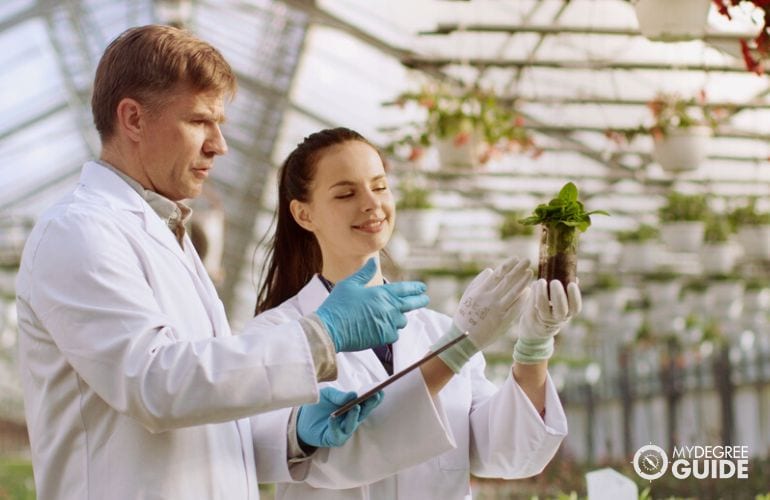
A masters degree in biotechnology can help prepare you for employment in a broad range of industries, including healthcare, business, agriculture, pharmaceuticals, environment, and more.
Careers related to biotechnology include biomedical engineering, biochemist, biostatistician, and microbiologist. Some graduates also pursue positions as agricultural or food scientists. These professionals work to increase the efficiency, safety, and sustainability of food production.
Biotech professionals may also enter management positions in private companies or research laboratories. They could oversee the development of new biotechnology products and methods. Those interested in advanced research or clinical positions often go on to pursue doctoral studies or medical school.
How Long Does It Take to Get a Biotechnology Master’s Degree Online?

Many graduate full-time students complete a masters in biotech degree in 1 to 2 years. As with an online masters in biochemistry, the length of your program can depend on your enrollment status, the required number of course credits, and other factors.
Generally, you can complete a 30 to 36-credit-hour biotech program in 1 year if you enroll full-time and year-round, including during the summer. Writing a master’s thesis or completing an internship may extend your studies by an additional 6 months to 1 year. If you enroll part-time, it will usually take longer to finish your degree.
What’s the Difference Between an MS in Biotechnology vs. Biomedical Engineering?
Biotechnology and biomedical engineering both use biology to create new technology, but there are a few key differences between these two fields.
| MS in Biotechnology | MS in Biomedical Engineering |
|
|
Your professional goals can help you figure out which degree best suits you.
Is a Master’s Degree in Biotechnology Worth It?
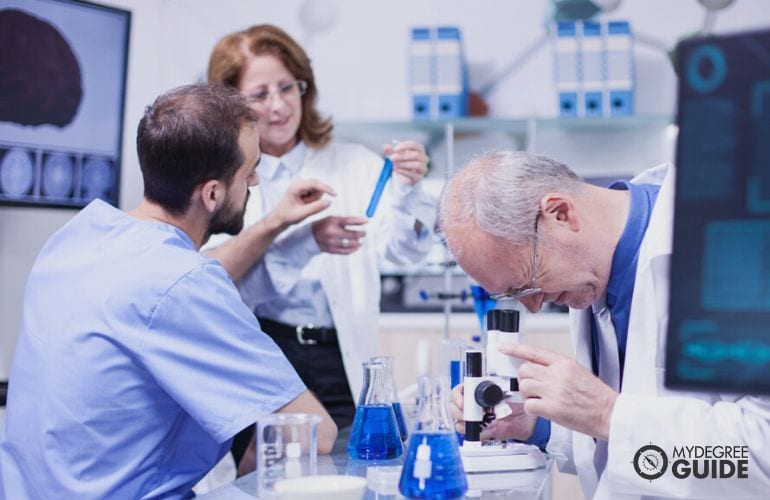
Yes, a master’s degree in biotechnology is worth it for many students. Earning a graduate degree in this field can help you prepare for a position as an innovator and scientist. There is also an increased demand for biotech professionals.
For example, the Bureau of Labor Statistics projects that the employment of biochemists and biophysicists will increase by 15% over the next ten years. This versatile degree can also help you find employment in various industries, such as agriculture, healthcare, pharmaceuticals, environmental science, business, and higher education.
Getting Your Master Degree in Biotechnology Online

Much like with a biology online degree, you can work toward turning your love of science into a rewarding and potentially lucrative career by completing an online masters in biotech. The field of biotechnology blends biology and technology to improve human health and well-being.
Many biotechnology masters programs allow you to specialize in a subfield like bioinformatics, drug design, or stem cell research. These concentrations can make you more competitive in the job market and enable you to pursue your passions.
Ready to take the first step? You can get started today by researching accredited schools to see which online biotech masters program is right for you.
